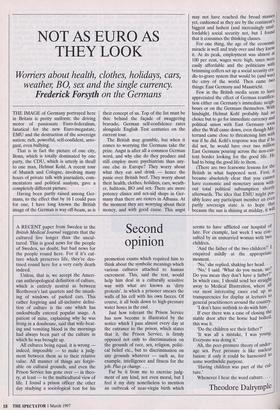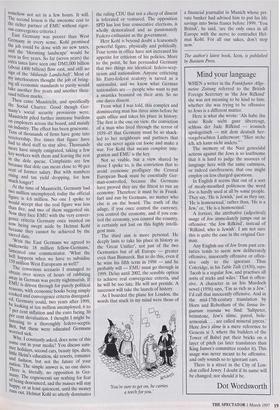NOT AS EURO AS THEY LOOK
Worriers about health, clothes, holidays, cars,
weather BO, sex and the single currency.
Frederick Forsyth on the Germans THE IMAGE of Germany portrayed here in Britain is pretty uniform: the driving motor of passionate Euro-federalism, fanatical for the new Euro-megastate, EMU and the destruction of the sovereign nation; rich, powerful, self-confident, arro- gant, even bullying.
That is in fact the picture of one city, Bonn, which is totally dominated by one party, the CDU, which is utterly in thrall to one man, Helmut Kohl. A recent tour of Munich and Cologne, involving many hours of private talk with journalists, com- mentators and political analysts, gave a completely different picture.
Having been partly raised among Ger- mans, to the effect that by 16 I could pass for one, I have long known the British image of the German is way off-beam, as is their concept of us. Top of the list must be this: behind the façade of swaggering bravado, German self-confidence rates alongside English Test centuries on the current tour.
The British may grumble, but when it comes to worrying the Germans take the prize. Angst is after all a common German word, and why else do they produce and still employ more psychiatrists than any- one else in Europe? They worry about what they eat and drink — hence the panic over British beef. They worry about their health, clothes, holidays, cars, weath- er, halitosis, BO and sex. There are more potency clinics and sex-aici shops in Ger- many than there are rioters in Albania. At the moment they are worrying about their money, and with good cause. This angst may not have reached the broad masses yet, cushioned as they are by the continent's biggest and lushest (and increasingly unaf- fordable) social security net, but I found that it consumes the thinking classes. For one thing, the age of the economic miracle is well and truly over and they know it. At its peak, employment was almost at 100 per cent, wages were high, taxes were easily affordable and the politicians with brimming coffers set up a social security cra- dle-to-grave system that would be (and was) the envy of the world. Then came two things: East Germany and Maastricht. Few in the British media seem to have appreciated the effect of German reunifica- tion either on Germany's immediate neigh- bours or on the Germans themselves. With hindsight, Helmut Kohl probably had 110 choice but to go for immediate currency and political union with East Germany soon after the Wall came down, even though Mit- terrand came close to threatening him with war if he did. Kohl's response was that if he did not, he would have over two million East Germans pouring across the non-evs- tent border looking for the good life. He had to bring the good life to them. (There are two fearsome lessons for the British in what happened next. First, It became absolutely clear that you cannot have economic and monetary union with- out total political subsumption shortly afterwards. The idea that EMU might pos- sibly leave any participant member an even partly sovereign state is to hope that because the sun is shining at midday, it will somehow not set in a few hours. It will. The second lesson is the awesome cost to the richer partner of EMU without rigor- ous convergence criteria.) East Germany was poorer than West Germany in every sense. Kohl promised the job could be done with no new taxes, and the 'blooming landscape' would be seen in five years. So far (seven years) the extra taxes have seen one DM1,000 billion (about £400 billion) flow east, and still no sign of the 'blahende Landschaft'. Most of My interlocutors thought the job of bring- ing all economic standards to parity would take another five years and another thou- sand billion marks. Then came Maastricht, and specifically the Social Charter. Good though Ger- many's social security provisions were, Maastricht piled further immense burdens on employers across the board, and mainly on industry. The effect has been gruesome. Tens of thousands of firms have gone into receivership, five times that figure have had to shed staff to stay alive. Thousands more have simply emigrated, taking a few key workers with them and leaving the rest in the dole queue. Complaints are few because that dole can mean close to 90 per cent of former salary. But with numbers rising and tax yield dropping, for how much longer? At the time of Maastricht, Germany had two million unemployed; today the official figure is 4.6 million. No one I spoke to would accept that the real figure was less than five, and two of them suggested six. Now they face EMU with the very conver- gence criteria Germany once insisted on now being swept aside by Helmut Kohl because they cannot be achieved by the sacred date. `With the East Germans we agreed to underwrite 18 million fellow-Germans,' lamented one commentator. 'What the hell happens when we have to subsidise 150 million West Europeans as well?' The consensus scenario I managed to obtain over scores of hours of rabbiting away in German was pretty nightmarish. If EMU is driven through for purely political reasons, with economic books being simply Cooked and convergence criteria disregard- ed, Germany could, two years after 1999, be looking at ten million unemployed, 6 to 7 per cent inflation and the euro facing 30 per cent devaluation. I thought I might be listening to a thoroughly federo-sceptic grit, but these were educated Germans worried sick. Why, I constantly asked, does none of this Mme out in your media? You discuss sum- mer holidays, second cars, beauty tips, diets, little Heini's education, ski resorts, romance and. fashion, but not the future of your non. The simple answer is, no one dares. There is, literally, no opposition in Ger- M,anY. The cognoscenti say nothing for fear °IL- being denounced, and the masses will stay 'PPY, or at least quiescent, until the money runs out. Helmut Kohl so utterly dominates the ruling CDU that not a cheep of dissent is tolerated or ventured. The opposition SPD has lost four consecutive elections, is wholly demoralised and as passionately Federo-enthusiast as the government.
Herr Kohl is beyond doubt a fearsomely powerful figure, physically and politically. Four terms in office have not increased his appetite for criticism of his policies. More to the point, he has persuaded Germany that two things are identical: federo-scep- ticism and nationalism. Anyone criticising his Euro-federal zealotry is tarred as a nationalist, and we know what German nationalists are — people who want to put a. swastika brassard on their arm. So no one dares dissent.
From what I was told, this complex and domineering man has three aims before he quits office and takes his place in history. The first is the one on view, the conviction of a man who lived through the terror of 1939-45 that Germany must be so shack- led to her neighbours and partners that she can never again cut loose and make a war. For Kohl that means complete inte- gration and EMU is the key. Not so visible, but a view shared by those I spoke to, is the conviction that to avoid economic profligacy the Central European Bank must be essentially Ger- man-controlled, because the Germans have proved they are the fittest to run an economy. Therefore it must be in Frank- furt and run by Germans, no matter who else is on the board. The truth of the adage, if you once control the currency, you control the economy, and if you con- trol the economy, you control the country, is certainly not lost on this highly intelli- gent man. The third aim is more personal. He deeply lusts to take his place in history as the 'Great Unifier', not just of the two Germanies but of all Europe — greater even than Bismarck. But to do this, even if he wins his fifth term in 1998 — and he probably will — EMU must go through in 1999. Delay until 2002, the sensible option to achieve real convergence criteria, and he will be too late. He will not preside. A successor will take the laurels of history.
As I boarded the plane for London, the words that stuck in my mind were those of `You're sure to get on, he carries a torch for you.' a financial journalist in Munich whose pri- vate banker had advised him to put his life savings into Swiss francs before 1999. 'You British', he said, 'are the only ones in all Europe with the nerve to contradict Hel- mut Kohl. For all our sakes, don't stop now.'



























































 Previous page
Previous page